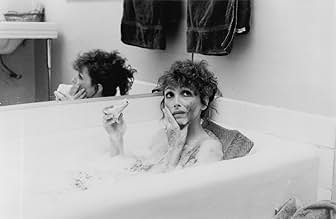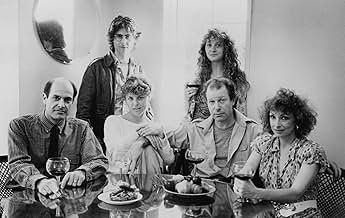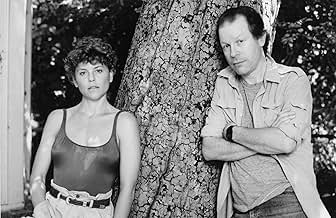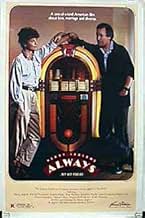A middle-aged couple, on the verge of proceeding with a divorce, find themselves questioning their decision to separate when fellow friends and neighbors, oblivious to their marital troubles... Read allA middle-aged couple, on the verge of proceeding with a divorce, find themselves questioning their decision to separate when fellow friends and neighbors, oblivious to their marital troubles, assemble at their house for a 4th of July Weekend party.A middle-aged couple, on the verge of proceeding with a divorce, find themselves questioning their decision to separate when fellow friends and neighbors, oblivious to their marital troubles, assemble at their house for a 4th of July Weekend party.
- Director
- Writer
- All cast & crew
- Production, box office & more at IMDbPro
Featured reviews
I had to fast forward through this movie more often than not. The lead characters were very unappealing and whiny. And I do mean whiny-- for example the lead character in so many words continually says throughout the movie, why why why do you want to leave me. Geez, get a life already. The support characters were much more interesting and for that reason earned this movie a 4.
Jaglom's personal diary on marital relationships. Watch this with a partner and then compare notes. Be warned - this film could start up divorce procedures! But you'd be amazed how frank this technical messy and poorly edited film can be!
You will appreciate this movie if you have ever had a loving healthy relationship, you will likely resent it if your experience doesn't reflect the respect and love shared on screen between spouses, family and friends. Henry Jaglom's character portrays a mentally fit and emotionally intelligent husband, which is rarely portrayed in film. I appreciate not having to wade through personality disorders or being being frustrated/anxious by watching people engage in toxic exchanges. This is a great movie for someone who doesn't seek need flawed characters on screen to make them feel better about themselves.
Unlike most movies about divorce, Always is not about hostility. While the leading couple argue at times in the movie, there is no doubt that they have great affection for each other throughout. But why are they getting a divorce, then?, you may ask. The movie refuses to give details about their conflict until close to the end, and even then we're left in the dark. All we see are their personalities and their chemistry, and this allows us not only to interpret the story as we see fit, but also to imagine ourselves in their shoes. And this is one of the few movies about a breakup that I've seen that even dares to spend most of its running time trying to convince us that the protagonists should stay together, and yet also suggests that everything will be ok even if they do not in the end, because unlike most movies, resolution of the plot doesn't require them to reconcile in the way we expect because we're watching an American movie about a marriage. There is so much more to a happy life than being in love, and we owe it to ourselves to find other ways to make life worthwhile, as Jaglom's character conveys in his final speech, which totally devastated me with its honesty, heartfeltedness and truth.
This film is insightful and funny in a way that only Henry Jaglom can produce, because he is one of the few American filmmakers alive today not bound by scripts. Jaglom understands that it is in the editing room, not the writer's-or even director's-chair that a movie really either reaches its full potential or becomes a fall-on-its-face disaster. He isn't afraid to cut scenes together in a way that break the theatrical rules that most movies feel obligated to follow, when they can convey a point better when pieced together in a sequence that simultaneously makes more and less sense.
Upon my first viewing of a Jaglom film (his 1990 masterpiece Eating), my first thought was "this isn't a movie, this is a *symphony*." Because it wasn't concerned with a plot, it was concerned with character, color, personality and emotion. I felt this again this evening upon watching Always, but even more so because the film is so constructed that the climax of the story is cut together in such a way that you don't feel like you're watching the climax of a movie, you feel like you're listening to the climax of a great work of classical music. Of course, by saying this I feel like I'm trying to describe color to a blind person, and I realize this will make no sense to people that have never seen one of his movies, but if you do see them, and try to accept them on their level, you may understand what I'm talking about.
Always also serves as a bridge between the two main periods of Jaglom's career, between his stream of consciousness, groundbreaking, provocative and (at times) devastatingly funny films of the 1970s and early 80s like Tracks, Sitting Ducks and A Safe Place, and his more recent, pseudo-documentary efforts like Babyfever, Venice/Venice and Eating. Always is a good compromise between the two types of movies in that it has the fantastic editing and storytelling techniques of the former and the dialogue-driven insight of the latter. In fact, I almost wish I'd begun watching his oeuvre with this movie, not only because it serves as a cross section of Henry's career, but because Always's theme (relationships) is his most universal of all the themes he's tackled. Not everyone can relate to having an eating disorder or a ticking biological clock, but most people can relate to being in love, and I was so pleased that Henry's film on the subject did it such justice.
This film is insightful and funny in a way that only Henry Jaglom can produce, because he is one of the few American filmmakers alive today not bound by scripts. Jaglom understands that it is in the editing room, not the writer's-or even director's-chair that a movie really either reaches its full potential or becomes a fall-on-its-face disaster. He isn't afraid to cut scenes together in a way that break the theatrical rules that most movies feel obligated to follow, when they can convey a point better when pieced together in a sequence that simultaneously makes more and less sense.
Upon my first viewing of a Jaglom film (his 1990 masterpiece Eating), my first thought was "this isn't a movie, this is a *symphony*." Because it wasn't concerned with a plot, it was concerned with character, color, personality and emotion. I felt this again this evening upon watching Always, but even more so because the film is so constructed that the climax of the story is cut together in such a way that you don't feel like you're watching the climax of a movie, you feel like you're listening to the climax of a great work of classical music. Of course, by saying this I feel like I'm trying to describe color to a blind person, and I realize this will make no sense to people that have never seen one of his movies, but if you do see them, and try to accept them on their level, you may understand what I'm talking about.
Always also serves as a bridge between the two main periods of Jaglom's career, between his stream of consciousness, groundbreaking, provocative and (at times) devastatingly funny films of the 1970s and early 80s like Tracks, Sitting Ducks and A Safe Place, and his more recent, pseudo-documentary efforts like Babyfever, Venice/Venice and Eating. Always is a good compromise between the two types of movies in that it has the fantastic editing and storytelling techniques of the former and the dialogue-driven insight of the latter. In fact, I almost wish I'd begun watching his oeuvre with this movie, not only because it serves as a cross section of Henry's career, but because Always's theme (relationships) is his most universal of all the themes he's tackled. Not everyone can relate to having an eating disorder or a ticking biological clock, but most people can relate to being in love, and I was so pleased that Henry's film on the subject did it such justice.
This poignant look at three couples in various stages of life can touch even the most stoic of hearts. I was barely a teen when I first saw this film, and almost 20 years later, I find it still has insight. Within minutes you feel like these people are your life-long friends, over for a July 4th barbecue. Single, married or divorced, many of the themes will hit home. No glitz and glamour here, it's down to earth and gets you thinking and reflecting on your own life decisions. And best of all, it grows with you.
From David & Judy's reminiscing about the speech he made on their first date, to their quirky bearded philosophical neighbor, I alternated between smiles, laughs & tears by the end of it. Fans of L.A. Law will recognize Alan Rachins as a hapless husband, drowning in the mediocrity of his own life. A young Melissa Leo (Homicide:Life on the Street) plays sister to the main character's wife, Jaglom's real-life ex, Patrice Townsend. Even the soundtrack, from Astaire to Torme, lends a wonderful backdrop to the film. Henry's stream-of-consciousness style doesn't suit all tastes, but it's what I love most about his work. I'm more than happy to leave behind the super-quick cuts, special effects, plastic characters and overzealous editing of today's blockbusters to savor this delicious slice of life.
From David & Judy's reminiscing about the speech he made on their first date, to their quirky bearded philosophical neighbor, I alternated between smiles, laughs & tears by the end of it. Fans of L.A. Law will recognize Alan Rachins as a hapless husband, drowning in the mediocrity of his own life. A young Melissa Leo (Homicide:Life on the Street) plays sister to the main character's wife, Jaglom's real-life ex, Patrice Townsend. Even the soundtrack, from Astaire to Torme, lends a wonderful backdrop to the film. Henry's stream-of-consciousness style doesn't suit all tastes, but it's what I love most about his work. I'm more than happy to leave behind the super-quick cuts, special effects, plastic characters and overzealous editing of today's blockbusters to savor this delicious slice of life.
Did you know
- TriviaThis was filmed in the wake of Henry Jaglom's divorce settlement. It was filmed with Jaglom's ex-wife, Patrice Townsend, who had left him about two years earlier. It was filmed in the house they had both lived in for all the years of their marriage. It also starred their friends and family.
- Crazy creditsThe credits play over authentic home movie footage of Jaglom's own wedding. There are only two credits to open the film: the title and "A Film by Henry Jaglom".
- ConnectionsFeatured in Who Is Henry Jaglom? (1995)
- SoundtracksSecret O' Life
Written and Performed by James Taylor
Details
Contribute to this page
Suggest an edit or add missing content






























